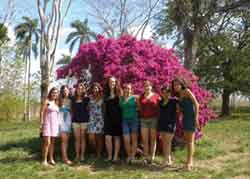A reminiscence of a Cuban excursion
- Submitted by: admin
- Travel and Tourism
- Culture and Traditions
- History
- international
- United States
- Personalities
- 03 / 26 / 2010

Freshmen in the FOCUS class Stranger than Paradise: Cuban Experiences of Revolution explored Cuba during spring break.
While you may have spent your spring break catching up on homework or watching TV, 14 freshmen in professor Joseph Schraibman’s FOCUS class Stranger than Paradise: Cuban Experiences of Revolution spent their break in Cuba.
The students had learned about the history of Cuba from colonialism to communism during the fall semester and studied Cuban cultural issues this semester.
The goal of the trip was to allow the students to have an interactive experience with the culture they had been studying in depth throughout the year. The students were also encouraged to practice their Spanish communication skills.
After speaking with students who went on the trip, I learned that most of them originally held the typical views our generation has of Cuba—a country wrought with poverty, stifled by communism and crumbling to the ground. Steve Fuller, one of
the 14 travelers, said he expected “animosity towards Americans, and people angry about living in poverty.” To his surprise and relief, many of the Cubans the group encountered welcomed the college students with open arms, hospitality and a vehement curiosity about life in America.
The very first experience the students had was getting off the plane and walking through a group of completely silent people, who had been eagerly awaiting the arrival of loved ones they probably had not seen for years; right away, the students understood the difficulties faced by families who are completely cut off from the outside world.
Upon entering the city of Havana, Antonya Gonzalez said she immediately noticed that all the vehicles parked on the road were straight out of the 1950s and ’60s; this is due to the embargo enacted in 1962 under the Kennedy administration.
While staying in Havana for four nights, the students had the opportunity to experience the Cuban lifestyle firsthand. One family across the street from their hotel let some students into the home, which was a tiny two-bedroom apartment with a bathroom.
Most people in Cuba work low-paying jobs, even lower than the worst-case scenario in the U.S. Something else that shocked the students was the lack of Internet and phone access. Cell phones are non-existent, while landlines and the Internet are too expensive for the general population.
Instead, the most widespread way of communicating is for people to wait in the streets, hoping that a friend may come by. Nevertheless, the majority of students said they were able to deal with the different environment.
Students described the FOCUS trip to Cuba as an experience of a lifetime and were fortunate to have had the opportunity.
Expeditions to enigmatic countries such as Cuba afford students the ability to truly understand and learn from a culture that is off-limits to most Americans.
Courtesy of Bill Little
By Allison Bischoff
Scene Reporter
Source: www.studlife.com
Comments